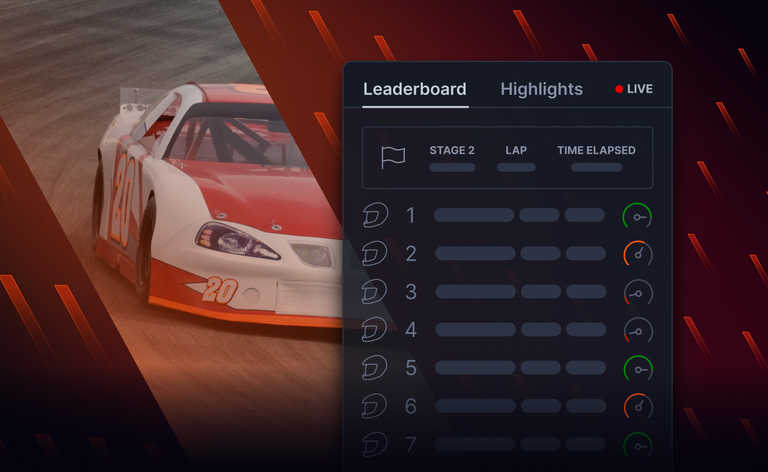Data revolutionized sport, now UX expectations are revolutionizing sports data. In the race to meet demands of mobile fans, can data providers rise to the challenge?
From Moneyball to Moneybart, sports data has been the subject of much hand-waving and many column inches. But now sports data itself is being transformed, both by the emergence of the digital sports fan, and new data-sharing technology standardizing live, participative experiences of sport. The Future of Sports Data is a new survey of hundreds of sports fans, industry leaders and commentators carried out by Ably Realtime and OnePulse, details niches, threats and opportunities in a changing market. Read the main findings below.
Sports data will be live
With mobile ubiquitous and data-transfer lightning fast, watching ‘a game’ on TV appeals mainly in terms of nostalgic value. Indications all point the demise of the traditional TV game in favor of a faster, more dynamic and ultimately more involved sports experience. TV viewing figures for this year’s Superbowl reached historic lows at 98.2m, dropping 12% from 2017, while streaming audiences and those watching across multiple devices jumped 20%.

As likely to bet on second-by-second action as on a game’s overall result, the average digital sports fan represents 40% of a global online gambling market with 9.8% CAGR, set to be worth upwards $73.45bn by 2024, according to a 2018 report from Hexa Research.
Estimates of this global market rise significantly if we take into account the legalisation of black markets in countries where betting on sports is partially or completely banned, and other countries’ concerted efforts to grow domestic sports sectors. Notable here is the much talked about strike down of the Professional and Amateur Sports Protection Act (PASPA) in the US in 2018, paving the way for legalized gambling across 32 states and bringing a sizeable black market above board. There is also the Chinese government’s campaign to grow its sports sector into a £647 billion industry by 2025.
Digital fans’ data-heavy demands
Further opportunities stem from the speed at which the sports gambling industry is switching to mobile. Our research reveals an unsaturated market. For example, Ably’s research revealed just 17% of respondents placed bets over mobile in the US. Once regulations are loosened this figure could likely double to match the current more-loosely regulated situation in the UK, where a growing 41% of sports fans place bets using smartphones.
As more fans switch to mobile, so the competitive playing field for data providers gets tougher. Mobile sports consumers are fickle and fast-moving, with a specific set of data-heavy demands and high-stakes expectations for their chosen platforms. The survey shows fans have little qualms about flitting between these if they perceive a risk of losing live bets as a result of slow or unreliable data, with almost 70% willing to change bet-provider at the first sign of inconvenience.
Inconvenience as an opportunity
Given 84% mobile fans surveyed had experienced frustrations using their smartphone for sports, in this emerging mobile sports market, providers who can eliminate common inconveniences have an easy headstart over competitors. Because bets are waged as the game unfolds, data delivery speed is key, with 88% fans placing ‘very high value’ on speed and reliability of data. The report details several key data transfer challenges providers must overcome to provide consistent, reliable services and cement customer loyalty.
Critical aspects in online sports UX include speed of information, especially for in-play bets, with anything above 200ms not perceived as realtime and putting players at a disadvantage. Synchronization in how data reaches multiple devices is also important in terms of the overall reliability of the information, especially now that 90% of US adults watch sports simultaneously on more than one device. With 80% of users following sports on the move, connectivity will also be key. Realtime data transfer systems need built-in state connection recovery systems to mitigate the impact of end-user disconnection, however brief. Finally, there is the issue of bursts in viewership — and subscriptions to data — at an unprecedented scale during peak moments of a game. Systems need in-built elasticity to react — in realtime — to sudden sharp bursts in data use.
The real sports data revolution
According to the report, viewed from a long-term perspective, meeting certain UX expectations is not so much about gaining an upper hand in the transformed sports data game, as entering the game in the first place.
Data volumes, and expectations of data users are set to rise exponentially. Organizations that concentrate too much on the delivery of data jeopardize chances staying ahead of the game through innovative use of available data
Quoted in the report, a number of sports leaders quoted in the report point to a dramatic, industry-wide reshuffle in the way data is distributed and consumed. Enabled by data, connected fans are enjoying sport in ways that were impossible before. Be it blockchain-enabled P2P betting, streaming sites to supplement mainstream transmissions, or realtime brackets pioneering new ways of fans engagement, the real commercial opportunity will be to forge ahead in the new entertainment landscape.
To find out more, download the report.
Additional information about data streaming infrastructure powering next-generation sports experience is available direct from the Ably team. Get in touch to find out more.
Ably would especially like to thank the following for their input to the survey:

— -
Ably’s high-performance global data stream network enables internet enabled devices — be they browsers, smartphones, servers or IoT sensors — to stream data to any other internet connected device in milliseconds.
Our infrastructure provides enterprize-scale data streaming and manages issues of scale, latency, data durability, integrity and storage, seamless connection recovery, device interoperability, network outages, encryption, security and authentication, throttling, and denial of service attacks. Plus developers love our APIs.
For more information, get in touch.




